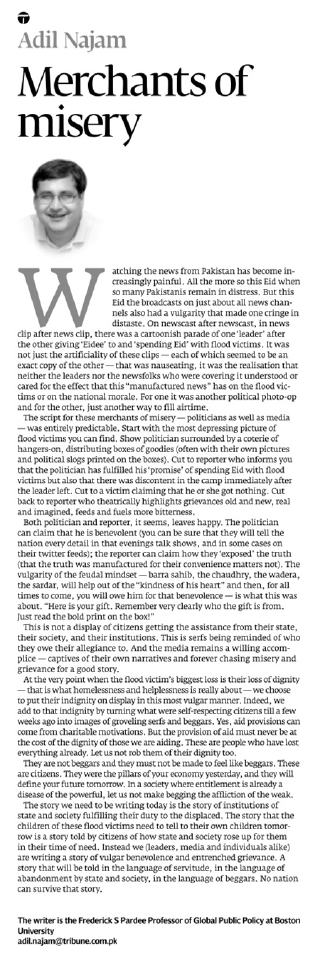Pardee Center Director Writes Op-Ed and Quoted on Pakistan Floods
 Prof. Adil Najam, Director of the Frederick S. Pardee Center for the Study of the Longer-Range Future and Boston University Professor of International Relations and Geography and Environment has been in the international and Pakistan media on the recent floods in Pakistan (also see here, here and here).
Prof. Adil Najam, Director of the Frederick S. Pardee Center for the Study of the Longer-Range Future and Boston University Professor of International Relations and Geography and Environment has been in the international and Pakistan media on the recent floods in Pakistan (also see here, here and here).
On September 15, Prof. Najam published an Op-Ed in the Pakistan daily The Express Tribune, titled ‘Merchants of Misery’ in which he commented on the way the Pakistani media and politicians are handing the floods and the relief efforts around them. In a strongly worded piece, Prof. Najam argued: “At the very point when the flood victim’s biggest loss is their loss of dignity — that is what homelessness and helplessness is really about — we choose to put their indignity on display in this most vulgar manner. Indeed, we add to that indignity by turning what were self-respecting citizens till a few weeks ago into images of groveling serfs and beggars. Yes, aid provisions can come from charitable motivations. But the provision of aid must never be at the cost of the dignity of those we are aiding. These are people who have lost everything already. Let us not rob them of their dignity too.”
Prof. Najam concluded the Op-Ed (here) with equally strong words, saying: “The story we need to be writing today is the story of institutions of state and society fulfilling their duty to the displaced. The story that the children of these flood victims need to tell to their own children tomorrow is a story told by citizens of how state and society rose up for them in their time of need. Instead we (leaders, media and individuals alike) are writing a story of vulgar benevolence and entrenched grievance. A story that will be told in the language of servitude, in the language of abandonment by state and society, in the language of beggars. No nation can survive that story.”
In a cover story on the Pakistan floods, in Newsline, one of Pakistan’s leading newsmagazines, Prof. Adil Najam is quoted with regards to whether the floods are related to global climate change. He is quoted as arguing that it is difficult to make a direct link at this point but the floods should alert Pakistani policymakers on the need and necessity to adopt sustainable development policies which are the best shield against the calamities that could come if the worst cases regarding global climate change come true.